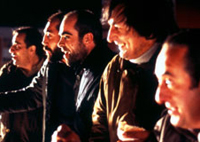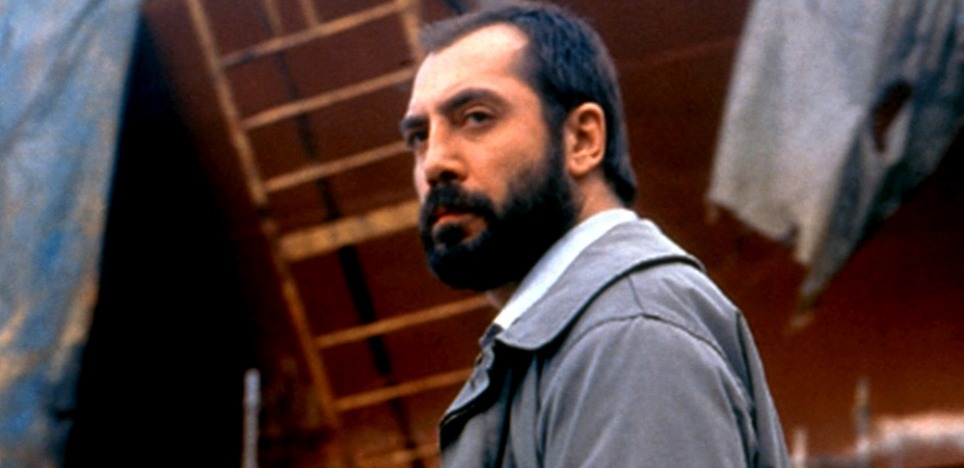"Cinema should deal with what it has at hand, with what it may forget because it doesn't want to see it. With local, everyday, prodigious stories," Spanish film director Fernando Leon de Aranoa said in reference to this extraordinary movie about six unemployed shipyard workers. Few filmmakers have chosen to deal with what happens in the workplace and fewer still cover the dire effects of not having any work at all. We recall the French film Time Out and, of course, the English comedy The Full Monty. But this one approaches its subject from many angles to paint a poignant portrait of the soul-destroying capacities of unemployment. For a review of the movie and a plot synopsis, click here. The film runs 113 minutes and is rated R for language.

1. The Only Ones Out of Work Are Human Beings
"A cosmological perspective on work can show us that all creatures in the universe have work — the galaxies and stars, trees and dolphins, grass and mountain goats, forests and clouds, chickens and elephants — all are working. The only ones out of work are human beings. The very fact that our species has invented unemployment ought to give us pause. Unemployment is not natural to the universe; it contradicts natural laws. It is also not healthy. That we settle for unemployment, especially when there is so much good work to be done, points up the fact that we do not live in a healthy world. By undergoing an awakening in cosmology — an awakening to the sense of the whole — we can bring about an awakening to the sense of our imaginations, which will, in turn, free us to reinvent work, create good work, cease compulsive and addictive work, and create possibilities of work for others," writes Matthew Fox in The Reinvention of Work: A New Vision of Livelihood for Our Time.
- What factors have caused the six men in this film to lose their jobs?
- Talk about Matthew Fox's cosmological perspective on unemployment. What new insights does it give you into this global issue? If unemployment is a cosmological problem, how can the world's religions address this dilemma?
2. Trapped in Abandoned Sectors of the World Economy
"French economist Jacques Attali describes a chilling picture of a global economy divided into two classes of people. The first group are 'rich nomads,' who are extremely mobile and whose resources give them access to virtually anything on the globe. The second are 'poor nomads,' denied any land or place to call home, trapped in abandoned sectors of the world economy, and having access to almost nothing," writes Jim Wallis in The Soul of Politics.
- Once the old shipyard is demolished, what is going to be put in its place? What scenes in the film best capture the anger the displaced workers feel for the kind of people Jacques Attali describes as "rich nomads"?
- Do you know anyone who is trapped in abandoned sectors of the global economy? Share that story. Which politician, economist, or social visionary has offered the best answer on how to assist the working class in this global, post-industrial world?
3. Despair Eats into Community Like an Evil Spirit
Matthew Fox in The Reinvention of Work: A New Vision of Livelihood for our Time says: "The results of lack of work are spiritually devastating. When people lack work they lack pride; they lack an opportunity to return their unique gift to the community; they also lack the means to provide the taxes that make services possible in the greater community. . . . When people lack work, they also lack hope. The resulting despair eats into community like an evil spirit."
- With which of the six characters dealing with the devastations of unemployment do you identify? Give a reason for your answer. Who among them seems to be most lacking in pride? in hope?
- One of the values of a sobering film like Mondays in the Sun is to give you an opportunity to see what you might do or feel like as an unemployed person. What aspects of your personality would come to the fore if you were in the same situation as these characters? What spiritual practices would you turn to as a ballast against rage, despair, and hopelessness?

4. The Spiritual Torment of Unemployment
In The Reinvention of Work: A New Vision of Livelihood for Our Times, Matthew Fox writes: "Alcoholism and abuse increase with rising unemployment, not just in response to the frustration and pressure we feel when we cannot pay our bills, but also out of the spiritual torment we suffer from the message that we are not needed in the universe, that our time here will not matter — in other words, that our presence is not precious."
- Discuss how the story connects unemployment with alcoholism. Talk about the role of Amador in the community and the importance of the scene where Santa sees what the old man's life has come down to in the end. Lino is a middle-aged man who feels that he is not needed in the universe. Share your reactions to the scenes where he goes for job interviews. Another man in spiritual torment is Jose whose wife has to get a night-shift job in a tuna-factory. How would you characterize his feelings when they go to the bank for a loan? Which scene best characterizes the spiritual torment of unemployment?
- What programs does your community offer to unemployed people? How can your spiritual group help address someone's feeling that their presence is not precious?

5. Befriending Your Anger
In Shadows of the Heart James D. and Evelyn E. Whitehead write: "My anger is trying to tell me something. Anger always carries information, but its message is seldom immediately clear. Befriending anger includes finding ways to retrieve this message."
- Why is Santa so angry and what lies behind his refusal to pay a fine for breaking a lamppost? Why does the children's book about the ant and the grasshopper bug him so much? What role does Santa play among the community of the unemployed? Is he a heroic figure to you or not? Give a reason why.
- If you were unemployed for a long period of time, how prominent do you think your anger would be in your repertoire of responses? Have you ever befriended your anger? What did you learn about yourself?
6. Boredom Drains Life and Vitality
In Feathers on the Wind, Edward Hays writes: "Boredom is like Swiss cheese. It's a condition in which dullness and drab repetition bore holes into our faith and love. Life and vitality can then easily drain out from those holes."
- How do these unemployed individuals try to battle boredom?
- Have you found that boredom drains vitality out of your life? How do you overcome the blahs?
7. Placing Ourselves on the Side of the Oppressed
"Human beings are so made that the ones who do the crushing feel nothing; it the person crushed who feels what is happening. Unless one has placed oneself on the side of the oppressed, to feel with them, one cannot understand," Simone Weil is quoted as saying in Megan McKenna's Send My Roots Rain.

This guide is one in a series of more than 200 Values & Visions Guides written by Frederic and Mary Ann Brussat. Text copyright 2004 by Frederic and Mary Ann Brussat. Photos courtesy of Lions Gate Films. This guide is posted as a service to visitors to www.SpiritualityandPractice.com. It may not be photocopied, reprinted, or distributed electronically without permission from Frederic and Mary Ann Brussat. For this permission and for a list of other guides in the Values & Visions series and ordering information, email your name and mailing address to: brussat@spiritualrx.com.
